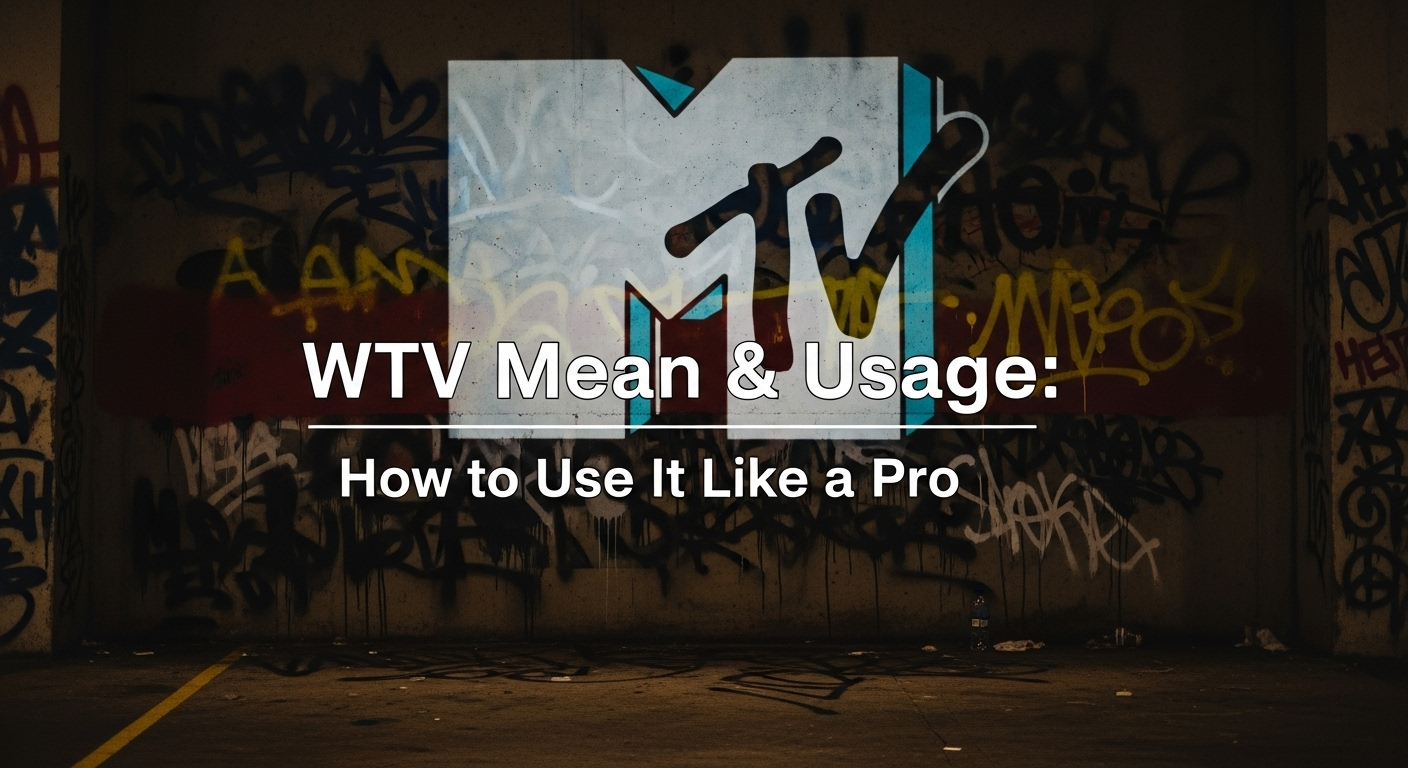WTV means with so much of our communication transmitted via text message and social media, it should come as no surprise that abbreviations and acronyms have spread to the conversation flow. One of those terms, one which has become more and more pervasive, particularly on tech-forward websites or in online messages, is “wtv.” But what is wtv, and why is it so ubiquitous? In this article, I will take you through the definition, origin and application of “wtv” with respect to the context of technology, digital communication and internet.
Understanding the Purpose: Informational Tech Content for Digital Professionals
Before we get into this, it’s worth explaining the reasoning behind this article. This article is meant for informational purposes and is aimed at individuals in the tech sector and those who are interested in digital communication tendencies. Whether you’re a programmer, journalist, teenager, or an active user of social media, you’ve already seen and used “wtv” before, impressed with yourself for anchoring your lexicon for internet jargon. If not, then worry not, this piece will show you how to perfectly employ and respond to “wtv”.
What Does WTV Mean?
WTV is short for “whatever.” It’s a shorthand way to say hell yeah, a helluva lot, and so on. It’s commonly used in text messages, online chats, forums, and on social media sites. It’s used to communicate indifference, zero preference or nonchalance and is the definition of apathy. So if someone asks, “What do you want for lunch?” and you respond, “wtv,” you’re basically saying, “I don’t care” or “whatever.”
WTV is short for “whatever” and recommends indifference or casually hanging loose. It’s popular with digital-savvy communicators, particularly younger users and among tech communities.
The Rise of Abbreviations in Tech Communication
The tech business runs on efficiency, and speed. When digital communication platforms such as instant messaging, Slack, Discord and SMS began to rise in popularity, users began to use abbreviations to save time and key strokes. Words like “lol” (laugh out loud), “brb” (be right back) and “wtv” (whatever) became keywords of this trend.
Folks use abbreviations such as “wtv” because time is of the essence. Abbreviating words allows you to type and communicate faster. It also saves space, a boon on character-counting platforms, like Twitter or in an SMS. And when they do, they join the digital lexicon.
How Semantic SEO Helps People Understand “WTV”
Search engines can now “see” more than just keywords, but the intent and context behind them. This is called semantic SEO. When folks search for “wtv mean,” they’re not only seeking a quick definition. What do all the emoji mean?
“WTV” ties in with similar thoughts and phrases, such as “whatever,” “anything,” “no preference,” and even “doesn’t matter.” Among the other similar abbreviations are “idc” (I don’t care), “nvm” (never mind) and “omw” (on my way). “Wtv” is used frequently in texting, online gaming, social media and workplace chats. Grouping these thoughts is important so that search engines can match what you are searching for with clear, complete answers.

Variations and Meanings of “WTV”
Though “wtv” is shorthand for “whatever,” its sentiment can change depending on the context. Others are more offhand: “Wtv, do your thing.” Sometimes it’s pleasant: “Wtv you want is fine with me.” At other times it is indifferent: “Wtv, I don’t care.”
People also say similar things, such as “anything goes,” “it’s up to you,” “no big deal” or “doesn’t matter to me,” they write. All these contribute to let people express a range of attitudes, from real flexibility to mild annoyance.
How “WTV” Appears in Search
Long-tail keywords assist in driving the traffic and user searches by mapping them with the exact information they are looking for. For instance, users search “what does wtv mean in texting,” “wtv meaning in chat,” “how to use wtv in a sentence,” or “wtv abbreviation tech slang.” By including these phrases, the search engine knows that your content answers actual questions in a clear and distinct way.
Not only will you become more relevant and integral to the reader, but you well see boost in rankings as search engines reward clear, in-depth answers.
Real-Life Examples of “WTV”
Below are a few brief examples of real life conversations that use wtv in tech chat:
In text messages:
Friend 1: “Want to play Valorant or Apex tonight?”
Friend 2: “Wtv, I’m good with either.”
At work:
Colleague 1: “Should we use Python or JavaScript for this script?”
Colleague 2: “Wtv works best for you.”
In forums:
User 1: “Is it better to use dark mode or light mode?”
User 2: “Wtv, I don’t really notice a difference.”
These examples show that “wtv” is a quick way to show flexibility, indifference, or no strong opinion — all of which can be useful in friendly or casual teamwork.
Why It’s Useful to Know Terms Like “WTV”
If you work in tech or on the internet, it pays to know slang such as “wtv.” It clarifies and accelerates your communication. It also helps you ensure that you keep up with the trends and you are always connected with your team, clients, or community. And last, understanding these casual shortcuts can prevent any confusion over tone or content.
Is “WTV” Still Popular in 2025?
In 2025, “wtv” continues to be widely used as a shortening in chats and at workplaces. New slang comes and goes, but “wtv” has endured because it’s short, to the point and can be used in casual and semi-formal situations.
Some people sprinkle in variations like “wtvz,” which throws in a little emphasis in a humorous or playful way. Others type “w/e” for “whatever,” although it’s not as prevalent as “wtv.” Keeping pace with small slang changes allow you to communicate with the language of the day, thus, not fall into disuse.
Conclusion: Mastering “WTV” for Better Digital Communication
In short, “wtv” means “whatever.” Among techies and online coders, it’s natural — time saving, versatile, and it reflects the high-speed, casual style of how we communicate digitally. Once you know what “wtv” means, when to use it and how it might sound, you’ll be better connected, less rattled by the rapid pace of internet culture.
FAQs: Understanding “WTV” in Tech Communication
Is “wtv” formal or informal?
“Wtv” is informal. It’s most effective in casual conversation, online chat, or with tech-savvy friends.
Can “wtv” sound rude?
Sometimes, yes. Depending on tone, it can seem dismissive. Always consider your audience.
Are there other abbreviations like “wtv”?
Yes: “idc” (I don’t care), “nvm” (never mind), and “w/e” (whatever).
Is “wtv” only used in English-speaking countries?
Mostly, although slang flies around the internet, so people in a lot of places get it.
Can I use “wtv” at work?
Bring it out just in conversations with colleagues who know internet slang. Using full words is still preferred for more formal communications.



